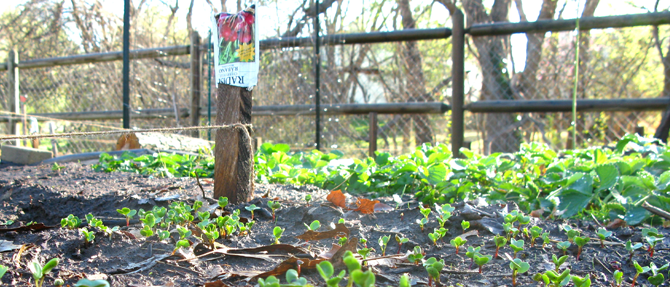By Rabbi Nathan Martin
Over the last few years I have turned my attention to growing summer vegetables. This project often starts in April with my attempts to cultivate early sprouts in the seed trays in our dining room (with dirt spills and all), and continues until the cool November frosts lay to bed the last of my tomato plants.
I take great pleasure in announcing, with fanfare, the elements of the summer’s dinner provided that day from one of my three garden plots. It is a great feeling to be feeding those I love with food that I have grown, harvested, and prepared. The process allows me to better understand the phrase from Psalm 90, “establish for us the work of our hands”
But there is an additional dimension of gardening that is deeply connected to my mindfulness practice. In my weekly sit on the cushion (I’m still working towards a daily practice) it doesn’t take long after settling in for me to become aware of the symphony of activity in my mind. I see myself working out numerous variations of conversations I plan to have later that day. I hear threads of music replaying themselves in a loop. And each time, I try as lovingly as I can to direct my attention back to the simple in and out of my breath. But gardening is different.
Sometimes, when my hands are working their way through the dirt, the stories and the music stop. I can spend long chunks of time simply digging, sifting, clearing with my mind relaxed and focused. It’s those moments when I realize that gardening can simply be another form of practice “off the mat.” It can be a chance for me to notice my breath, the warmth of the sun on my back, the feel of the dirt, the color and texture of the weeds, and ultimately the presence of that moment. After a particularly joyful weeding session I’ll even remember to thank the plants (out loud) for their generosity.
And then, like all forms of practice, this too passes, and I go back to worrying about whether the pepper plant will get enough sun, when I should be clearing out a patch of dirt for the next planting, and what I should be doing right now outside the garden.
But gardening has given me a glimpse of what it could be like to be present to each moment. Knowing that I’ve been able to experience a pure focus with the weeding, even for a few minutes, gives me hope that with continued practice I’ll be able to extend that kind of attention elsewhere to my relationships, reaching for more and more time in the present. In the meantime, I’m looking forward to this coming season’s engagement with dirt, pleasure, and hopefully quiet mind.

